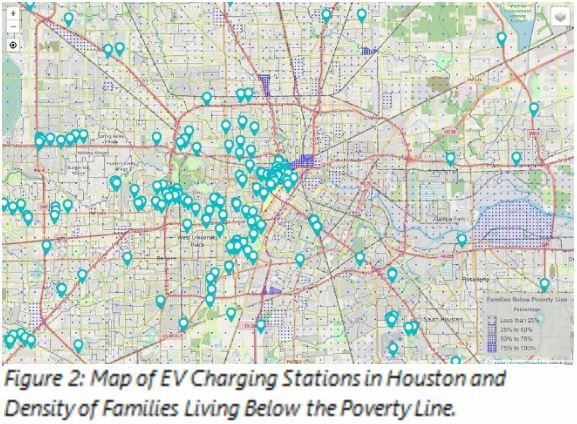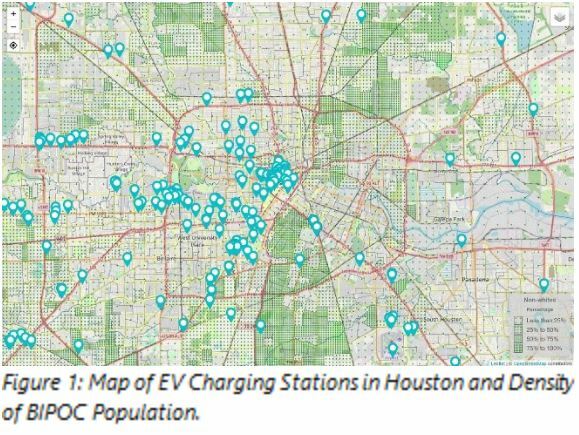TxDOT recently published a draft of its Electric Vehicle Infrastructure Plan, which outlines how the State will distribute $408MM in federal funding to build out its portion of a nationwide network of electric vehicle (EV) charging stations (EVSE) that “ensure a convenient, reliable, affordable, and equitable charging experience to all users.” The draft of the plan that TxDOT released will focus on designated Alternative Fuel Corridors (as mandated by the FHWA National Electric Vehicle Infrastructure (NEVI) Formula Program guidelines) before funding projects away from interstate routes and within urban and rural areas. Evolve Houston is pleased that TxDOT recognizes that some communities across Texas do not have sufficient resources or experience with EVs and that TxDOT intends to equitably distribute NEVI funds within the state’s rural and urban communities.
As the Greater Houston area is the state’s most populous and diverse region, several leaders and leading organizations across our footprint, particularly the City of Houston, have made commitments to ensure limitless choices, opportunities, and freedoms to its residents, especially those in historically underserved and marginalized communities, such as BIPOC, people with disabilities, low-income individuals, immigrants and refugees, senior citizens, and those with limited-English proficiency, and other compounding factors related to racial and ethnic disparities. Evolve Houston recommends that TxDOT, through its Electric Vehicle Infrastructure Plan, make similar commitments to ensure access and awareness, affordability, and availability of EVs, EVSE, and programs that encourage electrified transportation to all Texans. As the wider EV and EVSE markets continue to grow, programs such as TxDOT’s Electric Vehicle Infrastructure Plan are opportune to preventing the gap in resources from expanding and make electrified transportation accessible to all Texans.
While the broader transportation and energy markets indicate that widespread transportation electrification is inevitable, their distribution has so far been targeted toward communities that are adopting EVs in greater numbers. This strategy tends to direct EV and EVSE resources into more affluent areas, such as the west side of Houston, further increasing the gap in resources available to historically underserved communities (refer to Figure 1 and Figure 2). In fact, according to vehicle registration data obtained by Evolve Houston, in the past two years, historically underserved communities, such as Houston’s “Complete Communities”, have adopted EVs at rates quicker1 than the areas that have adopted the most total number of EVs. Despite this, the EVSE market continues to grow quicker in more affluent areas, even when the need in underserved communities, which often have lower access to at-home charging and rely more on public charging, is comparatively greater. Houston serves as just one example of inequitable EVSE investment across the state that can be prevented through the equitable evaluation of public charging projects applying for funding. When evaluating specific projects for NEVI funding, TxDOT should consider adding equity-related criteria that would help guarantee Texans living in underserved and marginalized communities are given the proper resources to participate in transportation electrification.


TxDOT is committed to enabling EV growth across the state regardless of location, demographics, or economic levels. They are aware that some communities face disparate access to and awareness of EVs and EVSE; both are needed to improve these communities’ opportunities and access to the human health, environmental, and economic benefits of transportation electrification. The $408MM allocated to the State is a great way to level the EV adoption playing field and provide access to resources for all Texans whether urban or rural, affluent or disadvantaged and converted to electrification or still converting. Adding equity to the Texas Electric Vehicle Infrastructure Plan project evaluation scoring criteria can help make this transition accessible, affordable, and available to all within the state. As such, we recommend that TxDOT makes more of a commitment to include equity in its EVSE project evaluation scoring criteria. Some thematic considerations include:
- Demographic and socio-economic status
- Proximity to historically disadvantaged communities
- Population living in multi-family unit dwellings
- Access to at-home or workplace charging
- Distance to nearest public charging (this will differ between urban and rural communities)
- Regional air quality and human health impacts
- Existing EVSE funding opportunities
- EV charging demand outside of the home (i.e.: public, workplace)
- Resident average vehicle miles traveled
Thank you both for the countless hours and immeasurable effort you have committed to researching and developing Texas’s EV Infrastructure Plan. Evolve Houston is optimistic that the Infrastructure Plan will make transportation electrification possible and plausible for all Texans. We speak for everyone in the state when we express how excited we are for Texas to serve as a leading example for EV charging infrastructure deployment.